E-Government Development in Morocco
Morocco has made significant progress in the area of e-Governance in recent years. The country has launched a number of initiatives aimed at improving service delivery and increasing citizen engagement through digital channels.
In order to ensure the continuity of the momentum created by the previous national strategy, Maroc Numeric 2013, and to further boost the development of the digital economy sector, a new vision, Maroc Numeric 2020, has been developed. It mainly focuses on accelerating Morocco’s digital transformation and strengthening the role of the country as a regional digital hub. To ensure the smooth implementation of these strategies, the country launched a national plan for 2018-2023 to expand the internet network and coverage in rural areas.
According to web-analytics portal SimilarWeb, among top e-Government websites there are Unified Social Register Portal with 578.3 thousand visits in June 2023, National Portal of Ministry of Justice with 682.3 thousand visits and Public Procurement Portal with 301 thousand visits.
Morocco has several partners (such as the European Union and the World Bank) in the area of digitalization, with whom it collaborates on various initiatives and projects aimed at promoting the growth of the digital economy. In 2023, the third financing of 450 million USD in the series was approved by the World Bank to continue supporting access to financial and digital services for individuals and businesses in Morocco.
Rankings
As of 2022, Morocco ranked 101st in the UN E-Government Development survey (compared to 106th in 2020), with an EGDI (e-Government Development Index) rating of 0.59. According to the World Bank GovTech Maturity Index, Morocco was among the countries with significant focus on GovTech with GTMI (GovTech Maturity Index) amounting to 0.613.
In 2021, Morocco ranked 8th in the “Digital Risers” (ranking of countries in terms of digital competitiveness) of countries in the MENA region (North Africa and the Middle East).
As reported in the national study conducted to assess the E-readiness index of Moroccan public e-services, results show that only 23% of national public e-services are fully digitised (the high level of maturity) and 60% of e-services are still informational (the low level of maturity). Plus, the granular assessment indicates that dependent e-services whose data and interactions depend on other administrations (external or internal) have the least rank.
Integration of Public Services
To promote the ICT sector in the country as well as to provide citizens with access to the online services of the Moroccan administration, E-GOV was launched. The platform has been implemented through a vast e-Government program consisting of a portfolio of 89 projects and services, under the responsibility of various organisations and administrations, for an overall investment of more than 2 billion dirhams (545 million USD).
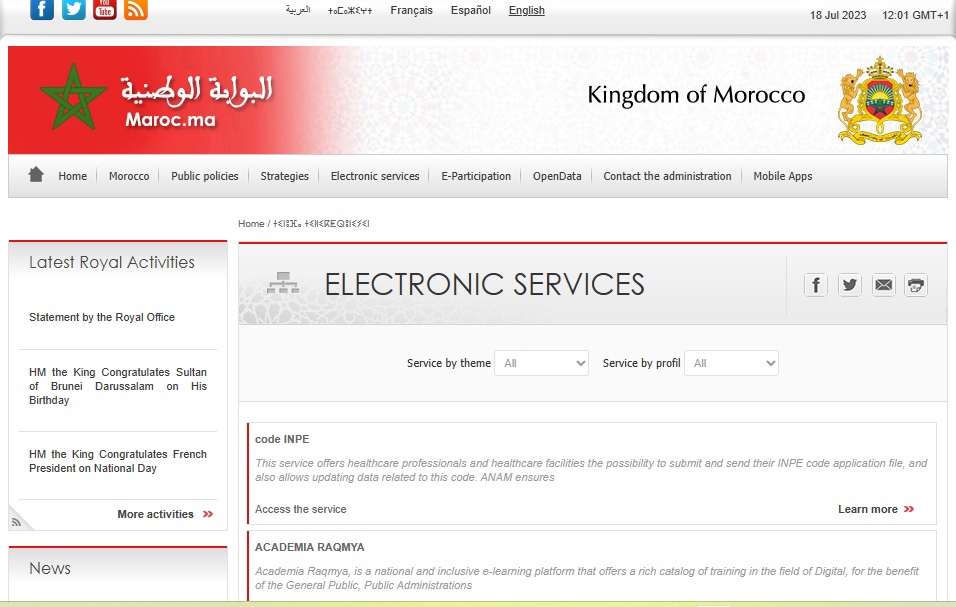
Source: Maroc.ma (e-services section)
Idarati.ma (Idarati - “my administration” in Arabic) is a public portal providing information on administrative procedures and e-Government services available online. This platform is the only official, reliable and integrated electronic space to obtain all information related to administrative services and to complete administrative transactions related to them. This portal exclusively includes administrative procedures and decisions that have been approved by the National Committee for Administrative Procedures, and its content is being gradually updated and renewed with all decisions approved by the Committee. The site provides information on 6 fields, including Work and Employment, Health and Social Affairs, etc.
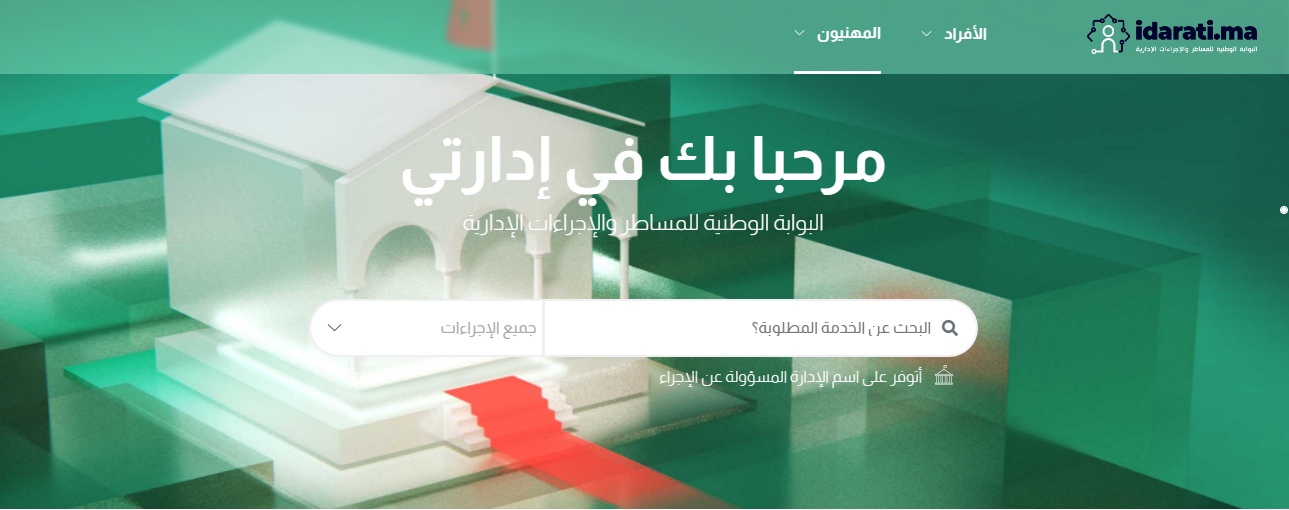
Source: Idarati (main page)
Identification and Biometrics
Following the National Digital Strategy of 2013, the government of Morocco has launched some e-projects including the creation of biometric passports which are issued without any age condition to any Moroccan citizen who requests them unless a court decision opposes it. A new form of the document offers greater security, speed of verification at checkpoints and compliance with international standards. Along with biometric passports, the Moroccan administration has implemented electronic national identity cards which considerably simplify the administrative procedures for obtaining certain documents (in particular the certificate of residence).
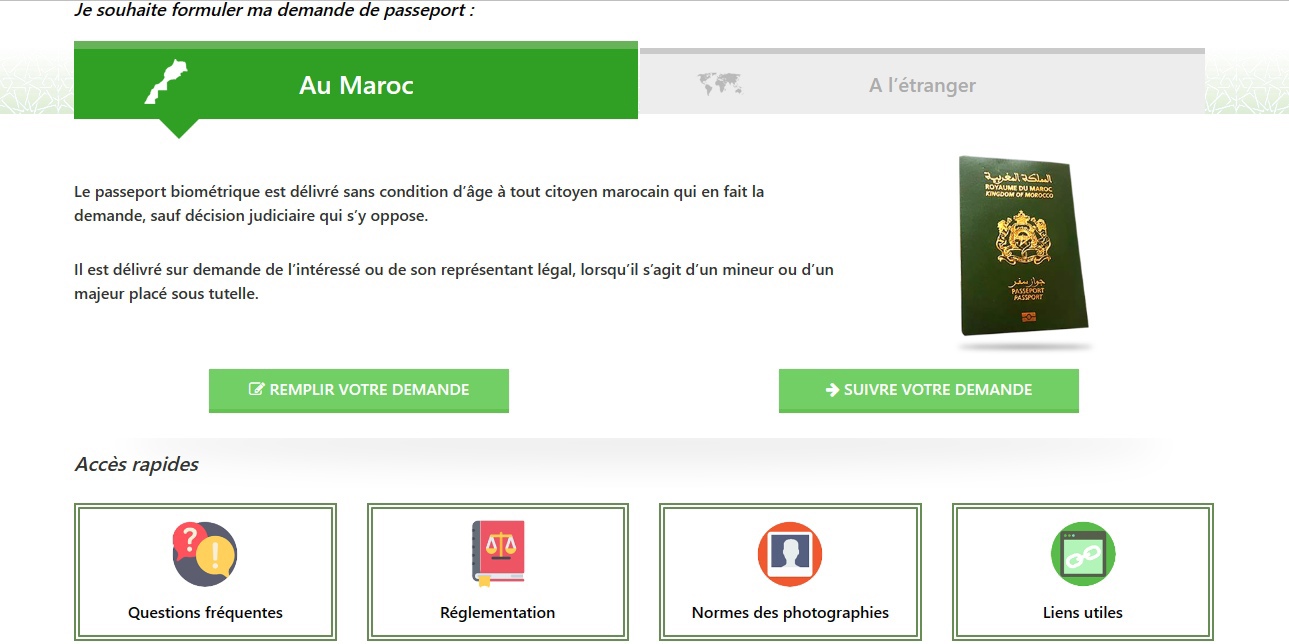
Source: Passeport.ma (main page)
e-Taxes
In the field of Economy and Finance, a number of e-services have been set in motion. The General Tax Department developed Online Tax Services (such as Simple-VAT (Value-added tax), Simpl-IS (Corporate tax), Simple-IR (Income tax) and other services) that enable users to fulfil their tax obligations electronically. Such services include tax forms, tax deadlines, complaint forms, and even tax guides which simplify the procedure, improving transparency and cost reduction for both the taxpayer and the administration.
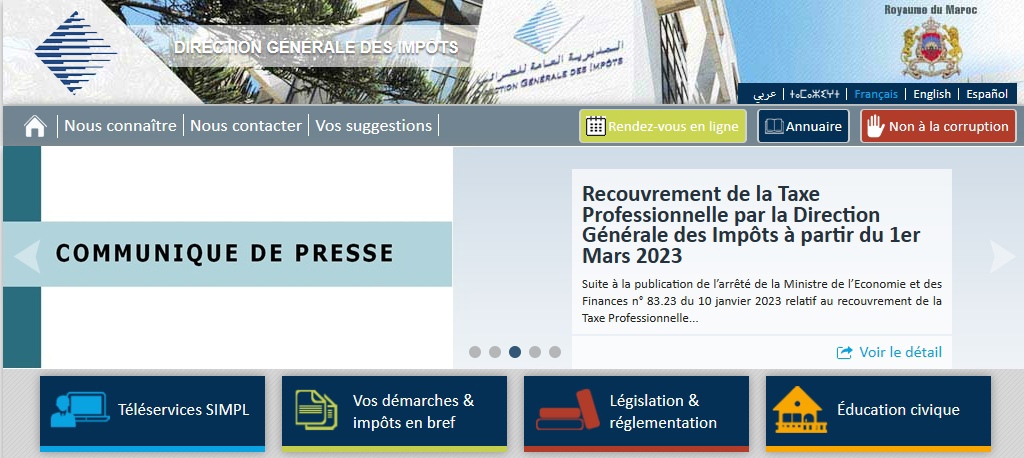
Source: Online Tax Service (main page)
Education
Morocco has implemented an e-schooling platform called TelmidTICE to provide students online learning opportunities. The platform, which is available in both Arabic and French, was launched in collaboration with the Ministry of National Education, Vocational Training and Scientific Research. The TelmidTICE platform offers a range of features, including interactive courses, videos, and practice exercises. Teachers can also use the platform to create and manage virtual classrooms, set assignments, and monitor student progress. The platform is accessible to all students in Morocco and can be accessed on a variety of devices, including smartphones, tablets, laptops, and desktop computers. The implementation of the TelmidTICE platform has been particularly useful during the COVID-19 pandemic when schools were closed, and students had to resort to online learning.
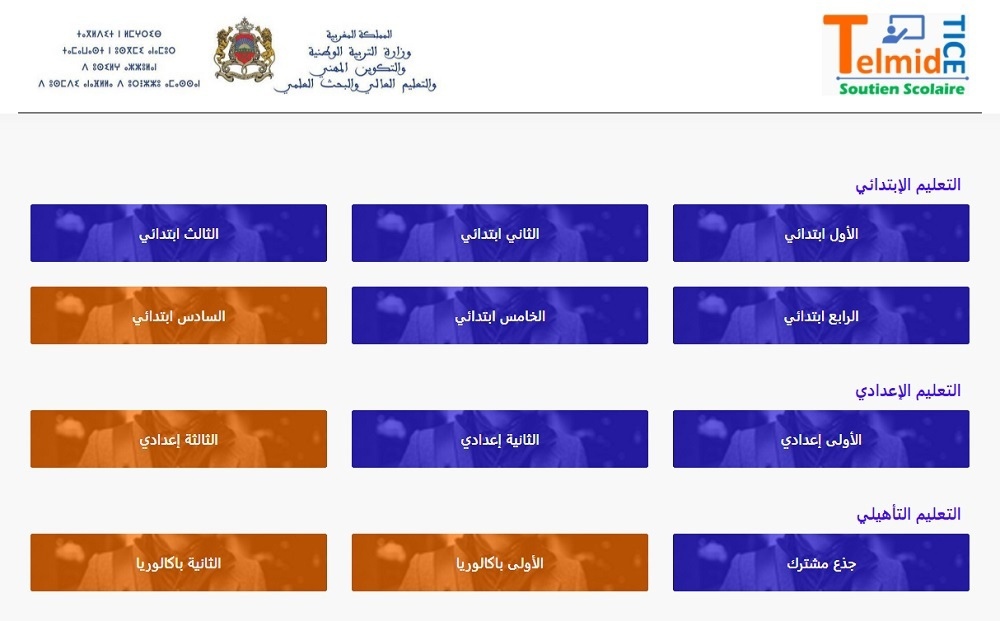
Source: TelmidTICE (main page)
In 2022, the Moroccan Ministry of Youth announced the creation of a digital library with more than 36,000 books, freely accessible to every citizen. The books are categorised by age group and subject. Every week, the digital library will be updated with new books published by more than 400 authors. According to the Ministry, the library was created to diversify the digital services offered by media libraries and contribute to the vulgarisation of new information technology standards in the publishing sector.
Healthcare
In 2022, a meeting aimed at creating a national e-health system was held. The new platform is to put an end to the fragmentation of existing e-health systems implemented by university hospitals, regional health authorities, and different national health programs. Two national programs with established e-platforms are the SMI-PF application for the National Program for Mother and Child Health and the ISILAT application for the National Program for the Fight against Tuberculosis.
Tourism
One of the key initiatives in the area of tourism is the development of a national tourism portal, which serves as a one-stop-shop for tourists looking for information and services related to travel, accommodation, and activities in the country. The portal offers a range of features, including online booking and payment system, interactive maps, and virtual tours of tourist attractions.
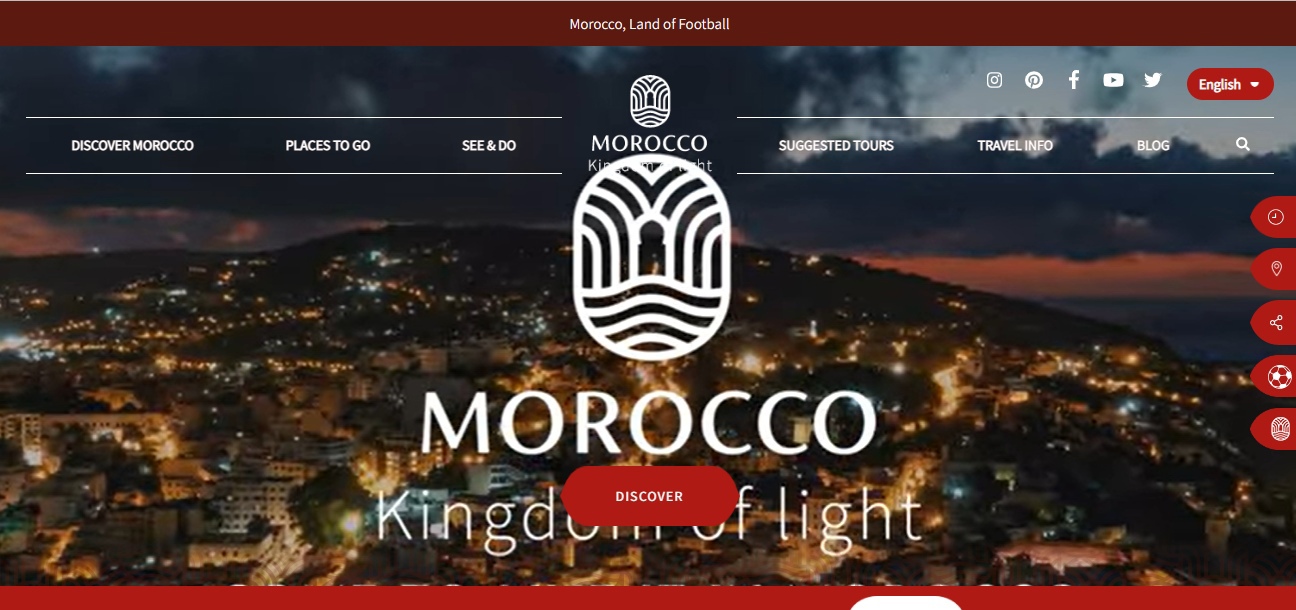
Source: Official website of tourism (main page)
Legislation
The official website of the House of Representatives of Morocco provides comprehensive information and resources related to the functioning and activities of the legislative body. The website features various sections and pages that offer details about the House, its members, legislative work, news, publications, and services. Additionally, the website features sections dedicated to the legislative process, where visitors can find information about enacted laws, draft bills, and the various stages and procedures followed during the legislative process.
The Ministry of Justice has implemented a range of e-services including online legal consultation, the possibility to schedule appointments at courts and tribunals online as well as to download and fill out legal forms and to have access to legal documents online (such as judgments and court decisions). According to SimilarWeb, in June 2023 the site of the Ministry was the 4th most popular government website in Morocco with about 683.3 thousand visits.
G2B and Public Procurement
The Stratup Hub portal, launched in 2019 in Rabat, was set up by the Digital Development Agency (ADD). Through this platform, the young innovative companies benefiting and listed at the level of this portal, will have the possibility of paying in foreign currency for services imported in connection with their activities up to 500,000 DH per calendar year. In accordance with the Morocco growth strategy (Horizon 2025), it is planned to create a net of more than 2,500 startups over the next five years.
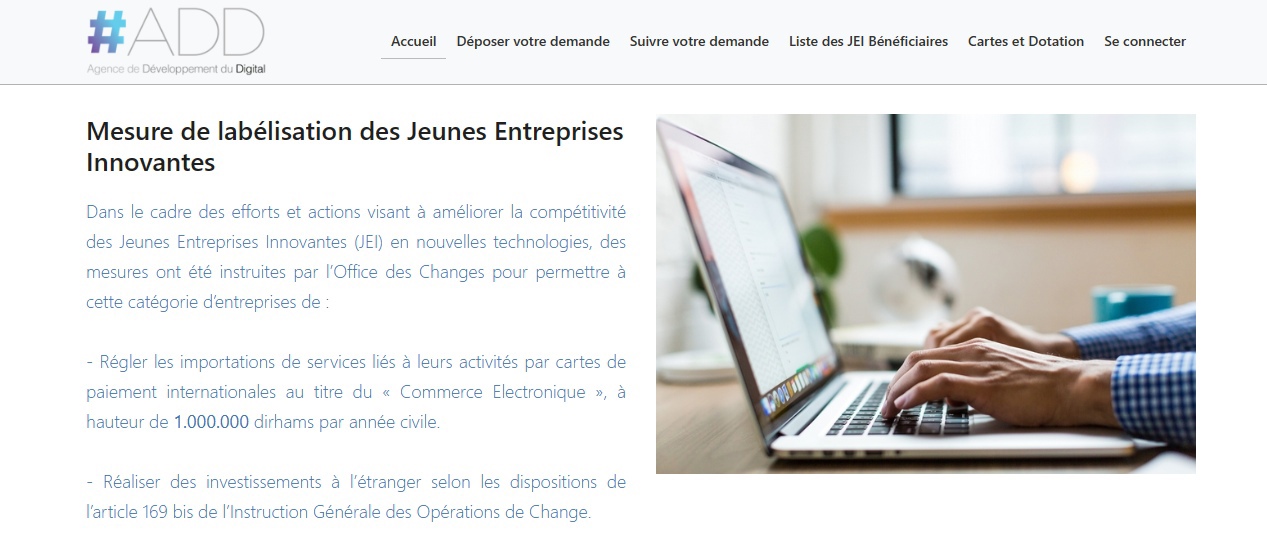
Source: Startup Hub Portal (main page)
Public Procurement Portal of Morocco serves as a hub for publishing contract awards and tender notices and allows users to view and download tender documents. The e-procurement platform ranked 5th most visited government website in June 2023 with the number of visits exceeding 300 thousand visits.

Source: Public Procurement Portal (main page)
Artificial Intelligence
In January 2022, The President of the Economic, Social and Environmental Council (CESE), Ahmed Réda Chami, called for the establishment of a national policy dedicated to artificial intelligence (AI) by giving it priority in the digital transformation project. He highlighted that it is necessary to ensure, within a maximum period of 3 years, widespread access to high-speed Internet for the entire population, with a satisfactory quality of service and an affordable competitive price. Since 2020, several AI start-ups have been launched: ATLAN Space, Jobop SARL, DataPathology.
According to the OECD AI policy observatory, as for 2023, venture capital investments in AI in Morocco have increased to 9 million USD. In May 2023, Israel and Morocco agreed to establish a research centre aimed at the development of innovations and AI.
Author:
Sofia Alypova
Have you spotted a typo?
Highlight it, click Ctrl+Enter and send us a message. Thank you for your help!
To be used only for spelling or punctuation mistakes.